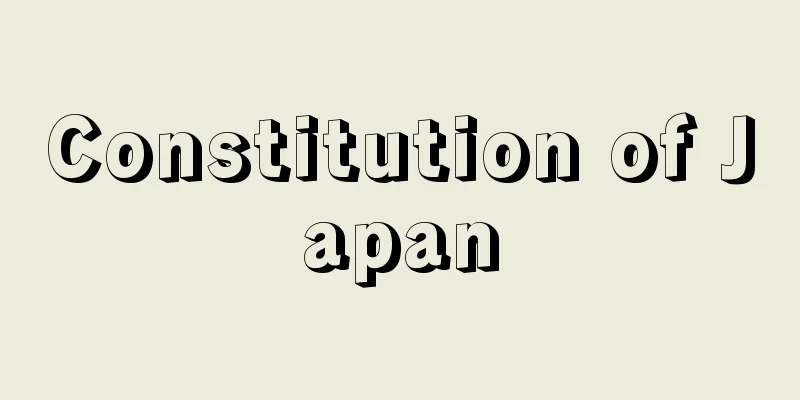Constitution of Japan

|
Enacted: May 3, 1947
We, the Japanese people, desire lasting peace and are deeply conscious of the high ideals governing human relationship, and we have determined to preserve our security and existence, trusting in the justice and faith of the peace-loving peoples of the world. We desire to occupy an honored place in an international society striving for the preservation of peace, and the banishment of tyranny, slavery, oppression and intolerance for all time from the earth. We recognize that all peoples of the world have the right to live in peace, free from fear and want. We believe that no nation should be concerned only with its own concerns and ignore other nations, and that the laws of political morality are universal, and that abiding by these laws is the responsibility of every nation which wishes to maintain its sovereignty and stand on an equal footing with other nations. The Japanese people, upon the basis of their national honor, pledge all their efforts to attain these lofty ideals and purposes.
Article 2. The Imperial Throne shall be dynastic and succeeded to in accordance with the Imperial House Law passed by the Diet. Article 3 All acts of the Emperor in matters of state require the advice and approval of the Cabinet, and the Cabinet shall be responsible therefor. Article 4 The Emperor shall perform only such acts in matters of state as are provided for in this Constitution and shall have no powers related to government. The Emperor may delegate the performance of his acts in matters of state as provided by law. Article 5. When a Regent is appointed in accordance with the Imperial House Law, he shall perform acts relating to matters of State in the name of the Emperor. In such case the provisions of the first paragraph of the preceding Article shall apply mutatis mutandis. Article 6 The Emperor shall appoint the Prime Minister as designated by the Diet. The Emperor shall appoint the Chief Justice of the Supreme Court as designated by the Cabinet. Article 7. The Emperor, with the advice and approval of the Cabinet, shall perform the following acts in matters of state on behalf of the people: 1. Promulgation of constitutional amendments, laws, cabinet orders, and treaties. 2. To convene the Diet. 3. Dissolve the House of Representatives. 4. To publicly announce the holding of a general election of members of the Diet. (5) To attest to the appointment and dismissal of Ministers of State and other officials as determined by law, and to the full powers and credentials of Ambassadors and Ministers. (6) Attesting amnesty, special pardon, commutation of sentence, remission from execution of sentence, and restoration of rights. 7. Awarding honors. (8) Attestation of instruments of ratification and other diplomatic documents as required by law. 9. Receiving foreign ambassadors and ministers. Tenth, performing ceremonies. Article 8. No property may be transferred to, or acquired by, the Imperial House, nor any gifts may be made unless pursuant to a resolution of the Diet. Chapter 2 Renunciation of War In order to accomplish the aim of the preceding paragraph, land, sea, and air forces, as well as other war potential, will never be maintained. The right of belligerency of the state will not be recognized. Chapter III Rights and Obligations of Citizens Article 11. The people shall not be prevented from enjoying any of the fundamental human rights. The fundamental human rights guaranteed to the people by this Constitution shall be conferred upon this and future people as eternal and inviolate rights. Article 12. The freedoms and rights guaranteed to the people by this Constitution shall be maintained by the constant endeavor of the people, who shall refrain from any abuse of these freedoms and rights and shall always be responsible for utilizing them for the public welfare. Article 13. All of the people shall be respected as individuals. Their right to life, liberty, and the pursuit of happiness shall, to the extent that it does not interfere with the public welfare, be the supreme consideration in legislation and other governmental affairs. Article 14. All of the people are equal under the law and there shall be no discrimination in political, economic or social relations because of race, creed, sex, social status or family origin. The peerage and other aristocratic systems are not recognized. The award of honors, medals, and other distinctions carries no privileges and is valid only for the lifetime of the person who currently holds or may hereafter receive them. Article 15. The right to choose and dismiss public officials is the inherent right of the people. All public servants are servants of the whole, not of a part. Universal adult suffrage is guaranteed for the election of public officials. The secrecy of the vote in all elections shall not be violated. No voter shall be held accountable publicly or privately for his choice. Article 16. Every person shall have the right to peacefully petition for the redress of damage, the removal of public officials, the enactment, repeal or amendment of laws, ordinances or regulations, and other matters, and no person shall be in any way discriminated against for making such a petition. Article 17. When any person has suffered damage as a result of the tort of a public official, he may sue the State or a public entity for compensation as provided by law. Article 18. No person shall be held in any form of slavery, nor shall he be compelled to perform involuntary servitude except as punishment for crime. Article 19. Freedom of thought and conscience shall not be violated. Article 20. Freedom of religion is guaranteed to all. No religious organization may receive any privileges from the State, nor exercise any political authority. No one shall be compelled to take part in any religious act, celebration, rite or event. The State and its organs shall refrain from religious education or any other religious activity. Article 21 Freedom of assembly, association, speech, press, and all other freedoms of expression are guaranteed. Censorship shall not be permitted. The secrecy of any communication shall not be violated. Article 22. Every person shall have freedom to choose and change his residence and to choose his occupation to the extent that it does not interfere with the public welfare. Everyone's freedom to emigrate to a foreign country and to divest himself of his nationality shall not be infringed. Article 23. Academic freedom is guaranteed. Article 24 Marriage shall be based only on the mutual consent of both sexes and shall be maintained through mutual cooperation with the equal rights of husband and wife as a basis. With regard to choice of spouse, property rights, inheritance, choice of residence, divorce, and other matters relating to marriage and the family, laws shall be formulated on the basis of individual dignity and the essential equality of the sexes. Article 25. All people shall have the right to maintain the minimum standards of wholesome and cultured living. The State shall use its endeavors to improve and promote social welfare, social security, and public health in all spheres of life. Article 26. All people shall have the right to receive an equal education according to their ability, as provided by law. All citizens shall be obligated to have all children under their protection receive a basic education as provided by law. Compulsory education shall be free of charge. Article 27. All people shall have the right and the obligation to work. Standards regarding wages, working hours, rest, and other working conditions shall be fixed by law. Children must not be exploited. Article 28. The right of workers to organize and to bargain and act collectively is guaranteed. Article 29. Property rights shall not be infringed. The content of property rights shall be determined by law in accordance with the public welfare. Private property may be taken for public use, upon just compensation. Article 30. Citizens are obligated to pay taxes as provided by law. Article 31. No person shall be deprived of life or liberty, nor shall any other criminal penalty be imposed, except according to procedure established by law. Article 32. No person shall be denied the right of access to courts. Article 33. No person shall be arrested except on a warrant issued by a competent judicial officer and specifying the offense which is to be committed, unless he is arrested in the act of committing a crime. Article 34. No person shall be arrested or detained without being at once informed of the charges against him and without the immediate right of counsel. Nor shall he be detained without sufficient cause, which shall upon demand be immediately shown in open court in his presence and that of his counsel. Article 35. The right of all persons to be free from entries, searches, and seizures of their homes, papers, and effects shall not be violated except upon warrant issued for proper cause, except as provided for in Article 33, and describing the place to be searched and the things to be seized. Any search or seizure shall be conducted pursuant to a separate warrant issued by a competent judicial officer. Article 36 Torture and cruel punishment by public officials are absolutely prohibited. Article 37 In all criminal cases, the accused shall have the right to a speedy and public trial by an impartial court. A criminal defendant shall have full opportunity to examine all witnesses and shall have the right to compulsory procedure for the presence of witnesses on his behalf at public expense. A criminal defendant shall in all cases have the benefit of competent legal counsel. If the defendant is unable to provide such himself, the State shall provide for him. Article 38. No person shall be compelled to make testimony against himself. Confessions obtained under coercion, torture or threat, or after prolonged arrest or detention, shall not be admitted as evidence. No one shall be convicted or punished if the only proof against him is his own confession. Article 39. No person shall be held criminally responsible for an act which was lawful at the time it was committed, or of which he has previously been acquitted. Nor shall he be held criminally responsible for the same offense twice. Article 40. Any person, in case he is subsequently arrested or detained and subsequently found not guilty, may sue the State for compensation as provided by law. Chapter 4: The Diet Article 42. The Diet shall consist of two Houses, namely, the House of Representatives and the House of Councillors. Article 43. Both Houses shall be composed of elected members representative of all the people. The number of members of each House shall be determined by law. The qualifications of members of both Houses and their electors shall be fixed by law. However, there shall be no discrimination on grounds of race, creed, sex, social status, family origin, education, property or income. Article 45. The term of office of members of the House of Representatives shall be four years. However, in the event of the House of Representatives being dissolved, this term shall terminate prematurely. Article 46. The term of office of members of the House of Councillors shall be six years, with half of the members up for election every three years. Article 47. Electoral districts, method of voting, and other matters pertaining to the election of members of both Houses shall be fixed by law. Article 48. No person may be a member of both Houses simultaneously. Article 49. Members of both Houses shall receive appropriate annual salaries from the national treasury in accordance with law. Article 50. Except in cases provided by law, members of both Houses shall not be arrested while a session of the Diet is in session, and a Member arrested before the opening of a session shall be released for the duration of the session at the demand of the House. Article 51. Members of both Houses shall not be held responsible outside the House for speeches, debates, or votes cast in the House. Article 52. An ordinary session of the Diet shall be convoked once each year. Article 53. The Cabinet may decide to convene an extraordinary session of the Diet. The Cabinet must decide to convene such a session when so demanded by one-fourth or more of the total members of either House. Article 54. When the House of Representatives is dissolved, a general election of members of the House of Representatives must be held within forty days from the date of dissolution, and the Diet must be convoked within thirty days from the date of the election. When the House of Representatives is dissolved, the House of Councillors is also closed. However, in case of national emergency, the Cabinet may call the House of Councillors into an emergency session. Measures taken in an emergency session referred to in the proviso to the preceding paragraph shall be temporary and shall become void unless the House of Representatives consents to them within ten days after the next Diet session opens. Article 55. Each House shall judge disputes relating to the qualifications of its members. However, in order to deny a seat to a member, a resolution by a two-thirds majority of the members present is necessary. Article 56. Business cannot be transacted in either House unless one-third or more of total membership is present. Except as otherwise provided by this Constitution, all business in both Houses shall be decided by a majority of the members present, and in case of a tie, the presiding officer shall have the deciding vote. Article 57. Deliberations of both Houses shall be public. However, a secret meeting may be held if resolved by a two-thirds majority of those present. Each House shall keep a record of its deliberations, and shall publish and make available to general circulation such records, except such records of secret sessions as may be deemed to require special secrecy. If requested by at least one-fifth of the Members present, the votes of each Member shall be entered in the minutes. Article 58. Each House shall select its own president and other officers. Each House shall establish rules governing its meetings and other procedure, as well as internal discipline, and may punish any member who disturbs order within the House. However, in order to expel a member, a majority resolution of at least two-thirds of the members present is required. Article 59. Except as otherwise provided by this Constitution, a bill becomes a law when passed by both Houses. A bill that has been passed by the House of Representatives and on which the House of Councillors has a different resolution becomes a law when passed again by the House of Representatives by a two-thirds majority of the Members present. The provision of the preceding paragraph shall not prevent the House of Representatives from calling for the convening of a conference of both Houses as provided by law. If the House of Councillors fails to take action on a bill passed by the House of Representatives within sixty days, excluding periods of recess, after receiving the bill, the House of Representatives may consider it to have rejected the bill. Article 60. The budget must first be submitted to the House of Representatives. With regard to the budget, when the House of Councillors makes a decision different from that of the House of Representatives, and if no agreement can be reached even through a joint committee of both Houses, as provided for by law, or when the House of Councillors fails to make a decision within thirty days, exclusive of the period of recess after receiving the budget passed by the House of Representatives, the decision of the House of Representatives shall be the decision of the Diet. Article 61. With regard to the approval of the Diet which is necessary for the conclusion of a treaty, the provisions of the second paragraph of the preceding Article shall apply mutatis mutandis. Article 62. Both Houses may conduct investigations in relation to government, and may demand the presence and testimony of witnesses, and the production of records. Article 63. The Prime Minister and other Ministers of State, whether or not they hold seats in either House, may at any time be present in either House to speak on bills, and must be present when their presence is requested to give answers or explanations. Article 64. The Diet shall set up an impeachment court consisting of members of both Houses to try judges against whom removal proceedings have been filed. Matters relating to impeachment shall be determined by law. Chapter 5: The Cabinet Article 66. The Cabinet shall be composed of the Prime Minister, who shall be its head, and other Ministers of State as provided for by law. The Prime Minister and other Ministers of State must be civilians. The Cabinet shall be collectively responsible to the Diet in the exercise of executive power. Article 67. The Prime Minister shall be designated from among the members of the Diet by a resolution of the Diet. This designation shall take precedence over all other business. When the House of Representatives and the House of Councillors differ in their designation and no agreement can be reached even through a joint committee of both Houses, as provided for by law, or when the House of Councillors fails to make designation within ten days, exclusive of the period of recess after the House of Representatives has made designation, the decision of the House of Representatives shall be the decision of the Diet. Article 68. The Prime Minister shall appoint the Ministers of State, a majority of whom must be selected from among the members of the Diet. The Prime Minister may dismiss any Minister of State at will. Article 69. When the House of Representatives passes a resolution of no-confidence or rejects a resolution of confidence, the Cabinet must resign en masse, unless the House of Representatives is dissolved within ten days. Article 70. When the post of Prime Minister becomes vacant, or when the Diet is convened for the first time after a general election of members of the House of Representatives, the Cabinet must resign en masse. Article 71. In the cases provided for in the preceding two Articles, the Cabinet shall continue to perform its functions until a new Prime Minister is appointed. Article 72. The Prime Minister, representing the Cabinet, submits bills to the Diet, reports to the Diet on general affairs of state and on foreign relations, and exercises direction and supervision over the various administrative departments. Article 73. In addition to other general administrative affairs, the Cabinet shall carry out the following affairs: 1. To faithfully execute the law and manage the affairs of state. (ii) Handling diplomatic relations. (3) To conclude treaties, provided, however, that the prior, and in some cases subsequent, approval of the Diet shall be required. 4. To manage official affairs in accordance with standards prescribed by law. 5. Prepare a budget and submit it to the Diet. (6) To enact cabinet orders in order to implement the provisions of this Constitution and of laws, provided, however, that cabinet orders may not include penal provisions unless specifically delegated by such laws. (vii) Deciding on amnesty, special pardon, commutation of sentence, remission from execution of sentence, and restoration of rights. Article 74. All laws and Cabinet Orders must be signed by the competent Minister of State and countersigned by the Prime Minister. Article 75. A Minister of State shall not be liable to prosecution during his term of office without the consent of the Prime Minister. However, the right of prosecution shall not be prejudiced thereby. Chapter 6 Judiciary Special courts may not be established. Administrative agencies may not administer trials as the final courts. All judges shall be independent in the exercise of their conscience and shall be bound only by this Constitution and the law. Article 77. The Supreme Court has rule-making power with regard to matters relating to litigation procedure, to attorneys, to the internal discipline of the courts, and to the administration of judicial affairs. Prosecutors must follow rules established by the Supreme Court. The Supreme Court may delegate to lower courts the power to make rules for such courts. Article 78. Judges may not be removed except by public impeachment, except when judicially determined to be mentally or physically unable to perform their duties. Disciplinary action against judges may not be taken by administrative agencies. Article 79. The Supreme Court shall consist of a Chief Justice and such number of other judges as may be determined by law, all of whom shall be appointed by the Cabinet. The appointment of a Justice of the Supreme Court shall be subject to public review at the first general election of members of the House of Representatives held after his appointment, and shall be subject to further review at the first general election of members of the House of Representatives held ten years thereafter, and shall be subject to similar review thereafter. In the case referred to in the preceding paragraph, if the majority of voters favors the dismissal of a judge, the judge shall be dismissed. Matters relating to examination shall be prescribed by law. Supreme Court justices retire upon reaching the age required by law. All Justices of the Supreme Court shall receive at regular intervals an appropriate amount of remuneration which cannot be reduced during their term of office. Article 80. The judges of the inferior courts shall be appointed by the Cabinet from a list of persons nominated by the Supreme Court. Such judges shall hold office for ten years and may be reappointed, but shall retire from office upon reaching an age as determined by law. All judges of inferior courts shall receive at regular intervals a reasonable remuneration which cannot be reduced during their term of office. Article 81. The Supreme Court is the court of last resort with power to determine the constitutionality of any law, order, regulation or official act. Article 82. Trials and judgments shall be conducted in open court. When a court unanimously determines that public order or good morals are likely to be harmed, a trial may be conducted privately; however, trials of political offenses, offenses relating to the press, or cases in which the rights of people as guaranteed in Chapter III of this Constitution are in question shall always be conducted publicly. Chapter 7 Finances Article 84. The imposition of new taxes or the alteration of existing taxes shall be made only by law, or under conditions prescribed by law. Article 85. The expenditure of national funds, and the assumption of national debts, must be made pursuant to a resolution of the Diet. Article 86. The Cabinet must prepare a budget for each fiscal year and submit it to the Diet for consideration and resolution. Article 87. In order to cover unforeseen budgetary shortfalls, a reserve fund may be established by a resolution of the Diet and may be expended under the responsibility of the Cabinet. The Cabinet must obtain subsequent approval of the Diet for all expenditures from the reserve fund. Article 88. All property of the Imperial Household shall belong to the State. All expenses of the Imperial Household shall be appropriated in the budget and subject to the resolution of the Diet. Article 89. Public funds and other public property shall not be expended or appropriated for the use, benefit, or maintenance of any religious organization or association, or for any charitable, educational or benevolent endeavors not under public control. Article 90. All final accounts of national revenues and expenditures shall be audited annually by the Board of Audit, and the Cabinet shall submit them to the Diet together with the audit report in the following fiscal year. The organisation and powers of the Board of Audit shall be determined by law. Article 91. The Cabinet shall report regularly, and at least once a year, to the Diet and to the people on the state of the nation's finances. Chapter 8 Local Autonomy Article 93. Local public entities shall establish assemblies as their deliberative organs as provided for by law. The heads of local public entities, the members of their assemblies, and such other public officials as may be determined by law, shall be elected by direct popular vote within the local public entities. Article 94. Local public entities have the power to manage their property, handle their affairs, and execute their administration, and may enact ordinances within the scope of the law. Article 95. Special laws applicable only to local public entities cannot be enacted by the Diet without the consent of the majority of the voters of the local public entity concerned, as provided by law. Chapter 9 Amendments As soon as any amendment to the Constitution has been approved in accordance with the preceding paragraph, the Emperor, in the name of the people, shall immediately promulgate it as an integral part of this Constitution. Chapter 10 Supreme Law Article 98. This Constitution is the supreme law of the nation, and no law, order, imperial ordinance, or other act of government, or part thereof, contrary to the provisions hereof, shall have legal force or validity. It is necessary for Japan to observe in good faith the treaties it has concluded and established laws of international law. Article 99. The Emperor or the Regent as well as Ministers of State, members of the Diet, judges, and all other public officials have the obligation to respect and uphold this Constitution. Chapter 11 Supplementary Provisions The enactment of laws necessary for the implementation of this Constitution, the procedures for the election of members of the House of Councillors and the convocation of the Diet, as well as the preparatory procedures necessary for the implementation of this Constitution may be carried out prior to the date specified in the preceding paragraph. Article 101. If the House of Councillors is not yet established when this Constitution comes into effect, the House of Representatives will exercise the powers of the Diet until the House of Councillors is established. Article 102. Of the members of the House of Councillors serving their first term under this Constitution, the term of office for half of them shall be three years. Their terms shall be determined in accordance with law. Article 103 A minister of state, a member of the House of Representatives, judges and other civil servants currently in office at the time of the enforcement of this Constitution, who are recognized by this Constitution with a position corresponding to their position, will not naturally lose their position due to the enforcement of this Constitution, except in cases where a special provision is made by law. However, if a successor is elected or appointed under this Constitution, they will naturally lose their position. [参照項目] |The Constitution of JapanThe current Japanese constitutional code was enacted in place of the Constitution of the Empire of Japan (Meiji Constitution). It was promulgated on November 3rd, 1946, and came into effect on May 3rd, 1947. [Masaaki Ikeda] How the Constitution was establishedになったんです。 English: The first thing you can do is to find the best one to do. The House of Representatives spent two months deliberating in the House of Lords and a month, and both were passed after some amendments were made. The deliberations were actively conducted in the parliament, and many critical opinions were expressed, but in the end, due to the fact that GHQ had requested a prompt passage, there were very few opponents in both houses. The constitutional amendment bill was issued on November 3rd after the Privy Council passed, and was issued by the Emperor. It came into effect on May 3rd, 1947, in accordance with the provisions of Article 100 of the Constitution of Japan. [Masaaki Ikeda] Structure and characteristicsThe Constitution of Japan consists of the preamble and Chapter 11 Article 103. This is much longer than Chapter 7 Article 76 of the Meiji Constitution. This is because the Constitution of Japan has adopted a policy of providing all matters relating to the fundamental laws of the country, and the way in which each article is stipulated is also detailed compared to the Meiji Constitution. The basic principle is to establish pacifism from the outside and implement democratic politics from the inside. The implementation of democratic politics is run by two principles: popular sovereignty and respect for fundamental human rights, so the basic principles of the Constitution of Japan are popular sovereignty, respect for fundamental human rights, and pacifism. Popular sovereignty refers to the principle that sovereignty lies with the people, and the people "act through representatives in the legitimately elected Diet", and the democracy is established. Respect for fundamental human rights is the principle of respecting individuals as individuals, and its purpose is to protect the lives and freedom of each and every citizen. In order to realize a peaceful nation, it stipulates the abandonment of war and the non-retention of military forces. The contents of each chapter are outlined below. [Masaaki Ikeda] preambleIn the constitutions of all over the world, it is customary to put forward the preamble of the constitution's purpose, basic principles, and the determination of the person in charge of the constitution, and the Japanese Constitution also has a rather long preamble. It consists of four sections, which describes popular sovereignty, democracy, pacifism, and international cooperation. This preamble forms part of the constitution. [Masaaki Ikeda] EmperorWhen the Pacific War ended, there was arguing for the abolition of the emperor system, but the Constitution of Japan held the Emperor as a symbol of the unification of the nation and the people, and it was assigned to Chapter 1 (Articles 1 to 8). Although its position is hereditary system, it is considered to be "based on the general consensus of the Japanese people, where sovereignty exists." The Emperor only performs national acts as stipulated by the Constitution, and does not have authority over national administration. Moreover, all national acts require "advising and approval from the Cabinet," and the responsibility is given to the Cabinet. Thus, the Emperor's authority became completely ceremonial. [Masaaki Ikeda] Abandonment of warになったんです。 English: The first thing you can do is to find the best one to do. [Masaaki Ikeda] Rights and obligations of citizensChapter 3, "Rights and Obligations of Citizens" (Articles 10-40) defines the rights and obligations of other citizens, focusing on basic human rights. This is a part of Chapter 2 of the Meiji Constitution, "Rights and Obligations of Citizens of Subjects," but in comparison, the scope of human rights guaranteed has been greatly expanded, and the guaranteed method is also thoroughly implemented. Basic human rights include various freedoms, as well as suffrage and social rights. Suffrage is a natural consequence derived from the principle of popular sovereignty, and social rights are important as expressing the constitutional ideals of the social state. These human rights are ultimately guaranteed by the court's right to review laws (unconstitutional legislative review), and the effectiveness of these rights has increased. [Masaaki Ikeda] National DietThe Diet of the Constitution of Japan (Chapter 4, Articles 41-64) has a much higher position than the Imperial Diet of the Meiji Constitution. The Diet is, in a political sense, the "highest body of national authority," and not only monopolizes the legislative powers in its hands as the "the only legislative body of the country," but also has various political powers, such as the right to nominate the Prime Minister and the right to vote no confidence in the Cabinet, and can establish an impeachment court. The Diet takes a bicameral system (bicameral system), but it is a "lame-like bicameral system" that recognizes the superiority of the House of Representatives. Both Houses are made up of public elected members. [Masaaki Ikeda] CabinetUnder the Meiji Constitution, the Cabinet was not a constitutional body, but was defined by an imperial decree system of Cabinet officials, with the Emperor having administrative power, and the Minister of State simply assisting the Emperor individually. In contrast, under the Constitution of Japan (Chapter 5, Articles 65-75), the Cabinet has administrative power, and the Emperor has no involvement in this at all. In the organization of the Cabinet, the Prime Minister has superior positions, such as having the authority to appoint and dismiss other ministers of state. The Prime Minister is appointed by the Diet, but the will of the House of Representatives is superior, so in practical terms, the leader of the political party that holds the majority in the House of Representatives is nominated as Prime Minister. [Masaaki Ikeda] courtThe status and authority of the court became much stronger than the Meiji Constitution. Under the Meiji Constitution, cases under the jurisdiction of the courts were civil and criminal cases, but under the Constitution of Japan (Chapter 6, Articles 76-82), all legal disputes, including administrative cases, are tried. In addition, in order to ensure the voluntary independence of the judiciary, the Supreme Court was given the right to establish rules, and the judicial administrative powers also have this. In particular, it was important that the courts had the right to review laws (the right to review unconstitutional legislation), which allowed the courts to final interpretation of the provisions of the constitution (the Supreme Court, ultimately). [Masaaki Ikeda] FinanceThe Meiji Constitution established a chapter on "accounting" and stipulated tax legislation, government bonds, budgets, and financial statements, but many exceptions were also permitted to fiscal constitutionalism. In contrast, the Constitution of Japan (Chapter 7, Articles 83-91) further promoted fiscal constitutionalism, wiped out exceptions, and established the so-called Diet-centricism. This is embodied in tax law, the government's debt burden actions, and the fact that budgets must be governed by the Diet. [Masaaki Ikeda] Local GovernmentThe Meiji Constitution did not provide provisions regarding local autonomy, and all provisions relating to local politics were left to the law. However, the Constitution of Japan established Chapter 1 (Chapter 8 Articles 92-95) to provide for local autonomy. In other words, local autonomy was guaranteed as a constitutional system. Above all, the system must be established based on the "main purpose of local autonomy," and in particular, it stipulates that the heads of local governments and members of the assembly must be elected by residents, and local assembly must have the authority to enact ordinances. [Masaaki Ikeda] Constitutional amendmentConstitutional amendments (Chapter 9, Article 96) are proposed by the Diet with the approval of more than two-thirds of the general members of each House (currently in office), then submitted to a referendum, and the majority of those votes are supported. No amendments have been made to this day, but the Korean War led to the beginning of rearmament and the theory of constitutional amendment has been born and has been debated to this day. [Masaaki Ikeda] The highest lawIn legal theory, the Constitution is said to have the highest effect, but the Constitution of Japan established Chapter 1 (Chapter 10 Articles 97-99) to back this up. It states that the fundamental human rights guaranteed by the Constitution are permanent rights that cannot be violated, that laws that are contrary to the Constitution and actions of other state agencies are invalid, and that all civil servants, such as the Emperor and Minister, have an obligation to respect and defend the Constitution. In order to make the above-mentioned contents of the Constitution of Japan concrete, laws such as the Imperial House Law, Imperial Economic Law, Nationality Law, Petition Law, Fundamental Law of Education, Diet Law, Public Offices Election Law, Cabinet Law, National Administrative Organization Law, National Public Servant Law, Court Law, Public Prosecutors' Office Law, Finance Law, Accounting Law, Office of Audit Law, and Local Autonomy Law are established, and these can be called the "constitution in the substantive sense." [Masaaki Ikeda] "Outline of the Constitution of Japan" by Sato Isao, Complete Revised Third Edition (1985, Gakuyo Shobo)" ▽ "Constitution of Japan" by Hashimoto Kimitachi (1980, Yuhikaku)" ▽ "Samegawa Masayasu, Second Edition (Iwanami Shinsho)" [Reference items] | | | | | | | | Suffrage | | | | | | | | | | | | | | [Complete materials] |Source: Shogakukan Encyclopedia Nipponica About Encyclopedia Nipponica Information | Legend |
|
施行 昭和22年5月3日
日本国民は、恒久の平和を念願し、人間相互の関係を支配する崇高な理想を深く自覚するのであつて、平和を愛する諸国民の公正と信義に信頼して、われらの安全と生存を保持しようと決意した。われらは、平和を維持し、専制と隷従、圧迫と偏狭を地上から永遠に除去しようと努めてゐる国際社会において、名誉ある地位を占めたいと思ふ。われらは、全世界の国民が、ひとしく恐怖と欠乏から免かれ、平和のうちに生存する権利を有することを確認する。 われらは、いづれの国家も、自国のことのみに専念して他国を無視してはならないのであつて、政治道徳の法則は、普遍的なものであり、この法則に従ふことは、自国の主権を維持し、他国と対等関係に立たうとする各国の責務であると信ずる。 日本国民は、国家の名誉にかけ、全力をあげてこの崇高な理想と目的を達成することを誓ふ。
第二条 皇位は、世襲のものであつて、国会の議決した皇室典範の定めるところにより、これを継承する。 第三条 天皇の国事に関するすべての行為には、内閣の助言と承認を必要とし、内閣が、その責任を負ふ。 第四条 天皇は、この憲法の定める国事に関する行為のみを行ひ、国政に関する権能を有しない。 天皇は、法律の定めるところにより、その国事に関する行為を委任することができる。 第五条 皇室典範の定めるところにより摂政を置くときは、摂政は、天皇の名でその国事に関する行為を行ふ。この場合には、前条第一項の規定を準用する。 第六条 天皇は、国会の指名に基いて、内閣総理大臣を任命する。 天皇は、内閣の指名に基いて、最高裁判所の長たる裁判官を任命する。 第七条 天皇は、内閣の助言と承認により、国民のために、左の国事に関する行為を行ふ。 一 憲法改正、法律、政令及び条約を公布すること。 二 国会を召集すること。 三 衆議院を解散すること。 四 国会議員の総選挙の施行を公示すること。 五 国務大臣及び法律の定めるその他の官吏の任免並びに全権委任状及び大使及び公使の信任状を認証すること。 六 大赦、特赦、減刑、刑の執行の免除及び復権を認証すること。 七 栄典を授与すること。 八 批准書及び法律の定めるその他の外交文書を認証すること。 九 外国の大使及び公使を接受すること。 十 儀式を行ふこと。 第八条 皇室に財産を譲り渡し、又は皇室が、財産を譲り受け、若しくは賜与することは、国会の議決に基かなければならない。 第二章 戦争の放棄 前項の目的を達するため、陸海空軍その他の戦力は、これを保持しない。国の交戦権は、これを認めない。 第三章 国民の権利及び義務 第十一条 国民は、すべての基本的人権の享有を妨げられない。この憲法が国民に保障する基本的人権は、侵すことのできない永久の権利として、現在及び将来の国民に与へられる。 第十二条 この憲法が国民に保障する自由及び権利は、国民の不断の努力によつて、これを保持しなければならない。又、国民は、これを濫用してはならないのであつて、常に公共の福祉のためにこれを利用する責任を負ふ。 第十三条 すべて国民は、個人として尊重される。生命、自由及び幸福追求に対する国民の権利については、公共の福祉に反しない限り、立法その他の国政の上で、最大の尊重を必要とする。 第十四条 すべて国民は、法の下に平等であつて、人種、信条、性別、社会的身分又は門地により、政治的、経済的又は社会的関係において、差別されない。 華族その他の貴族の制度は、これを認めない。 栄誉、勲章その他の栄典の授与は、いかなる特権も伴はない。栄典の授与は、現にこれを有し、又は将来これを受ける者の一代に限り、その効力を有する。 第十五条 公務員を選定し、及びこれを罷免することは、国民固有の権利である。 すべて公務員は、全体の奉仕者であつて、一部の奉仕者ではない。 公務員の選挙については、成年者による普通選挙を保障する。 すべて選挙における投票の秘密は、これを侵してはならない。選挙人は、その選択に関し公的にも私的にも責任を問はれない。 第十六条 何人も、損害の救済、公務員の罷免、法律、命令又は規則の制定、廃止又は改正その他の事項に関し、平穏に請願する権利を有し、何人も、かかる請願をしたためにいかなる差別待遇も受けない。 第十七条 何人も、公務員の不法行為により、損害を受けたときは、法律の定めるところにより、国又は公共団体に、その賠償を求めることができる。 第十八条 何人も、いかなる奴隷的拘束も受けない。又、犯罪に因る処罰の場合を除いては、その意に反する苦役に服させられない。 第十九条 思想及び良心の自由は、これを侵してはならない。 第二十条 信教の自由は、何人に対してもこれを保障する。いかなる宗教団体も、国から特権を受け、又は政治上の権力を行使してはならない。 何人も、宗教上の行為、祝典、儀式又は行事に参加することを強制されない。 国及びその機関は、宗教教育その他いかなる宗教的活動もしてはならない。 第二十一条 集会、結社及び言論、出版その他一切の表現の自由は、これを保障する。 検閲は、これをしてはならない。通信の秘密は、これを侵してはならない。 第二十二条 何人も、公共の福祉に反しない限り、居住、移転及び職業選択の自由を有する。 何人も、外国に移住し、又は国籍を離脱する自由を侵されない。 第二十三条 学問の自由は、これを保障する。 第二十四条 婚姻は、両性の合意のみに基いて成立し、夫婦が同等の権利を有することを基本として、相互の協力により、維持されなければならない。 配偶者の選択、財産権、相続、住居の選定、離婚並びに婚姻及び家族に関するその他の事項に関しては、法律は、個人の尊厳と両性の本質的平等に立脚して、制定されなければならない。 第二十五条 すべて国民は、健康で文化的な最低限度の生活を営む権利を有する。 国は、すべての生活部面について、社会福祉、社会保障及び公衆衛生の向上及び増進に努めなければならない。 第二十六条 すべて国民は、法律の定めるところにより、その能力に応じて、ひとしく教育を受ける権利を有する。 すべて国民は、法律の定めるところにより、その保護する子女に普通教育を受けさせる義務を負ふ。義務教育は、これを無償とする。 第二十七条 すべて国民は、勤労の権利を有し、義務を負ふ。 賃金、就業時間、休息その他の勤労条件に関する基準は、法律でこれを定める。 児童は、これを酷使してはならない。 第二十八条 勤労者の団結する権利及び団体交渉その他の団体行動をする権利は、これを保障する。 第二十九条 財産権は、これを侵してはならない。 財産権の内容は、公共の福祉に適合するやうに、法律でこれを定める。 私有財産は、正当な補償の下に、これを公共のために用ひることができる。 第三十条 国民は、法律の定めるところにより、納税の義務を負ふ。 第三十一条 何人も、法律の定める手続によらなければ、その生命若しくは自由を奪はれ、又はその他の刑罰を科せられない。 第三十二条 何人も、裁判所において裁判を受ける権利を奪はれない。 第三十三条 何人も、現行犯として逮捕される場合を除いては、権限を有する司法官憲が発し、且つ理由となつてゐる犯罪を明示する令状によらなければ、逮捕されない。 第三十四条 何人も、理由を直ちに告げられ、且つ、直ちに弁護人に依頼する権利を与へられなければ、抑留又は拘禁されない。又、何人も、正当な理由がなければ、拘禁されず、要求があれば、その理由は、直ちに本人及びその弁護人の出席する公開の法廷で示されなければならない。 第三十五条 何人も、その住居、書類及び所持品について、侵入、捜索及び押収を受けることのない権利は、第三十三条の場合を除いては、正当な理由に基いて発せられ、且つ捜索する場所及び押収する物を明示する令状がなければ、侵されない。 捜索又は押収は、権限を有する司法官憲が発する各別の令状により、これを行ふ。 第三十六条 公務員による拷問及び残虐な刑罰は、絶対にこれを禁ずる。 第三十七条 すべて刑事事件においては、被告人は、公平な裁判所の迅速な公開裁判を受ける権利を有する。 刑事被告人は、すべての証人に対して審問する機会を充分に与へられ、又、公費で自己のために強制的手続により証人を求める権利を有する。 刑事被告人は、いかなる場合にも、資格を有する弁護人を依頼することができる。被告人が自らこれを依頼することができないときは、国でこれを附する。 第三十八条 何人も、自己に不利益な供述を強要されない。 強制、拷問若しくは脅迫による自白又は不当に長く抑留若しくは拘禁された後の自白は、これを証拠とすることができない。 何人も、自己に不利益な唯一の証拠が本人の自白である場合には、有罪とされ、又は刑罰を科せられない。 第三十九条 何人も、実行の時に適法であつた行為又は既に無罪とされた行為については、刑事上の責任を問はれない。又、同一の犯罪について、重ねて刑事上の責任を問はれない。 第四十条 何人も、抑留又は拘禁された後、無罪の裁判を受けたときは、法律の定めるところにより、国にその補償を求めることができる。 第四章 国会 第四十二条 国会は、衆議院及び参議院の両議院でこれを構成する。 第四十三条 両議院は、全国民を代表する選挙された議員でこれを組織する。 両議院の議員の定数は、法律でこれを定める。 第四十四条 両議院の議員及びその選挙人の資格は、法律でこれを定める。但し、人種、信条、性別、社会的身分、門地、教育、財産又は収入によつて差別してはならない。 第四十五条 衆議院議員の任期は、四年とする。但し、衆議院解散の場合には、その期間満了前に終了する。 第四十六条 参議院議員の任期は、六年とし、三年ごとに議員の半数を改選する。 第四十七条 選挙区、投票の方法その他両議院の議員の選挙に関する事項は、法律でこれを定める。 第四十八条 何人も、同時に両議院の議員たることはできない。 第四十九条 両議院の議員は、法律の定めるところにより、国庫から相当額の歳費を受ける。 第五十条 両議院の議員は、法律の定める場合を除いては、国会の会期中逮捕されず、会期前に逮捕された議員は、その議院の要求があれば、会期中これを釈放しなければならない。 第五十一条 両議院の議員は、議院で行つた演説、討論又は表決について、院外で責任を問はれない。 第五十二条 国会の常会は、毎年一回これを召集する。 第五十三条 内閣は、国会の臨時会の召集を決定することができる。いづれかの議院の総議員の四分の一以上の要求があれば、内閣は、その召集を決定しなければならない。 第五十四条 衆議院が解散されたときは、解散の日から四十日以内に、衆議院議員の総選挙を行ひ、その選挙の日から三十日以内に、国会を召集しなければならない。 衆議院が解散されたときは、参議院は、同時に閉会となる。但し、内閣は、国に緊急の必要があるときは、参議院の緊急集会を求めることができる。 前項但書の緊急集会において採られた措置は、臨時のものであつて、次の国会開会の後十日以内に、衆議院の同意がない場合には、その効力を失ふ。 第五十五条 両議院は、各ゝその議員の資格に関する争訟を裁判する。但し、議員の議席を失はせるには、出席議員の三分の二以上の多数による議決を必要とする。 第五十六条 両議院は、各ゝその総議員の三分の一以上の出席がなければ、議事を開き議決することができない。 両議院の議事は、この憲法に特別の定のある場合を除いては、出席議員の過半数でこれを決し、可否同数のときは、議長の決するところによる。 第五十七条 両議院の会議は、公開とする。但し、出席議員の三分の二以上の多数で議決したときは、秘密会を開くことができる。 両議院は、各ゝその会議の記録を保存し、秘密会の記録の中で特に秘密を要すると認められるもの以外は、これを公表し、且つ一般に頒布しなければならない。 出席議員の五分の一以上の要求があれば、各議員の表決は、これを会議録に記載しなければならない。 第五十八条 両議院は、各ゝその議長その他の役員を選任する。 両議院は、各ゝその会議その他の手続及び内部の規律に関する規則を定め、又、院内の秩序をみだした議員を懲罰することができる。但し、議員を除名するには、出席議員の三分の二以上の多数による議決を必要とする。 第五十九条 法律案は、この憲法に特別の定のある場合を除いては、両議院で可決したとき法律となる。 衆議院で可決し、参議院でこれと異なつた議決をした法律案は、衆議院で出席議員の三分の二以上の多数で再び可決したときは、法律となる。 前項の規定は、法律の定めるところにより、衆議院が、両議院の協議会を開くことを求めることを妨げない。 参議院が、衆議院の可決した法律案を受け取つた後、国会休会中の期間を除いて六十日以内に、議決しないときは、衆議院は、参議院がその法律案を否決したものとみなすことができる。 第六十条 予算は、さきに衆議院に提出しなければならない。 予算について、参議院で衆議院と異なつた議決をした場合に、法律の定めるところにより、両議院の協議会を開いても意見が一致しないとき、又は参議院が、衆議院の可決した予算を受け取つた後、国会休会中の期間を除いて三十日以内に、議決しないときは、衆議院の議決を国会の議決とする。 第六十一条 条約の締結に必要な国会の承認については、前条第二項の規定を準用する。 第六十二条 両議院は、各ゝ国政に関する調査を行ひ、これに関して、証人の出頭及び証言並びに記録の提出を要求することができる。 第六十三条 内閣総理大臣その他の国務大臣は、両議院の一に議席を有すると有しないとにかかはらず、何時でも議案について発言するため議院に出席することができる。又、答弁又は説明のため出席を求められたときは、出席しなければならない。 第六十四条 国会は、罷免の訴追を受けた裁判官を裁判するため、両議院の議員で組織する弾劾裁判所を設ける。 弾劾に関する事項は、法律でこれを定める。 第五章 内閣 第六十六条 内閣は、法律の定めるところにより、その首長たる内閣総理大臣及びその他の国務大臣でこれを組織する。 内閣総理大臣その他の国務大臣は、文民でなければならない。 内閣は、行政権の行使について、国会に対し連帯して責任を負ふ。 第六十七条 内閣総理大臣は、国会議員の中から国会の議決で、これを指名する。この指名は、他のすべての案件に先だつて、これを行ふ。 衆議院と参議院とが異なつた指名の議決をした場合に、法律の定めるところにより、両議院の協議会を開いても意見が一致しないとき、又は衆議院が指名の議決をした後、国会休会中の期間を除いて十日以内に、参議院が、指名の議決をしないときは、衆議院の議決を国会の議決とする。 第六十八条 内閣総理大臣は、国務大臣を任命する。但し、その過半数は、国会議員の中から選ばれなければならない。 内閣総理大臣は、任意に国務大臣を罷免することができる。 第六十九条 内閣は、衆議院で不信任の決議案を可決し、又は信任の決議案を否決したときは、十日以内に衆議院が解散されない限り、総辞職をしなければならない。 第七十条 内閣総理大臣が欠けたとき、又は衆議院議員総選挙の後に初めて国会の召集があつたときは、内閣は、総辞職をしなければならない。 第七十一条 前二条の場合には、内閣は、あらたに内閣総理大臣が任命されるまで引き続きその職務を行ふ。 第七十二条 内閣総理大臣は、内閣を代表して議案を国会に提出し、一般国務及び外交関係について国会に報告し、並びに行政各部を指揮監督する。 第七十三条 内閣は、他の一般行政事務の外、左の事務を行ふ。 一 法律を誠実に執行し、国務を総理すること。 二 外交関係を処理すること。 三 条約を締結すること。但し、事前に、時宜によつては事後に、国会の承認を経ることを必要とする。 四 法律の定める基準に従ひ、官吏に関する事務を掌理すること。 五 予算を作成して国会に提出すること。 六 この憲法及び法律の規定を実施するために、政令を制定すること。但し、政令には、特にその法律の委任がある場合を除いては、罰則を設けることができない。 七 大赦、特赦、減刑、刑の執行の免除及び復権を決定すること。 第七十四条 法律及び政令には、すべて主任の国務大臣が署名し、内閣総理大臣が連署することを必要とする。 第七十五条 国務大臣は、その在任中、内閣総理大臣の同意がなければ、訴追されない。但し、これがため、訴追の権利は、害されない。 第六章 司法 特別裁判所は、これを設置することができない。行政機関は、終審として裁判を行ふことができない。 すべて裁判官は、その良心に従ひ独立してその職権を行ひ、この憲法及び法律にのみ拘束される。 第七十七条 最高裁判所は、訴訟に関する手続、弁護士、裁判所の内部規律及び司法事務処理に関する事項について、規則を定める権限を有する。 検察官は、最高裁判所の定める規則に従はなければならない。 最高裁判所は、下級裁判所に関する規則を定める権限を、下級裁判所に委任することができる。 第七十八条 裁判官は、裁判により、心身の故障のために職務を執ることができないと決定された場合を除いては、公の弾劾によらなければ罷免されない。裁判官の懲戒処分は、行政機関がこれを行ふことはできない。 第七十九条 最高裁判所は、その長たる裁判官及び法律の定める員数のその他の裁判官でこれを構成し、その長たる裁判官以外の裁判官は、内閣でこれを任命する。 最高裁判所の裁判官の任命は、その任命後初めて行はれる衆議院議員総選挙の際国民の審査に付し、その後十年を経過した後初めて行はれる衆議院議員総選挙の際更に審査に付し、その後も同様とする。 前項の場合において、投票者の多数が裁判官の罷免を可とするときは、その裁判官は、罷免される。 審査に関する事項は、法律でこれを定める。 最高裁判所の裁判官は、法律の定める年齢に達した時に退官する。 最高裁判所の裁判官は、すべて定期に相当額の報酬を受ける。この報酬は、在任中、これを減額することができない。 第八十条 下級裁判所の裁判官は、最高裁判所の指名した者の名簿によつて、内閣でこれを任命する。その裁判官は、任期を十年とし、再任されることができる。但し、法律の定める年齢に達した時には退官する。 下級裁判所の裁判官は、すべて定期に相当額の報酬を受ける。この報酬は、在任中、これを減額することができない。 第八十一条 最高裁判所は、一切の法律、命令、規則又は処分が憲法に適合するかしないかを決定する権限を有する終審裁判所である。 第八十二条 裁判の対審及び判決は、公開法廷でこれを行ふ。 裁判所が、裁判官の全員一致で、公の秩序又は善良の風俗を害する虞があると決した場合には、対審は、公開しないでこれを行ふことができる。但し、政治犯罪、出版に関する犯罪又はこの憲法第三章で保障する国民の権利が問題となつてゐる事件の対審は、常にこれを公開しなければならない。 第七章 財政 第八十四条 あらたに租税を課し、又は現行の租税を変更するには、法律又は法律の定める条件によることを必要とする。 第八十五条 国費を支出し、又は国が債務を負担するには、国会の議決に基くことを必要とする。 第八十六条 内閣は、毎会計年度の予算を作成し、国会に提出して、その審議を受け議決を経なければならない。 第八十七条 予見し難い予算の不足に充てるため、国会の議決に基いて予備費を設け、内閣の責任でこれを支出することができる。 すべて予備費の支出については、内閣は、事後に国会の承諾を得なければならない。 第八十八条 すべて皇室財産は、国に属する。すべて皇室の費用は、予算に計上して国会の議決を経なければならない。 第八十九条 公金その他の公の財産は、宗教上の組織若しくは団体の使用、便益若しくは維持のため、又は公の支配に属しない慈善、教育若しくは博愛の事業に対し、これを支出し、又はその利用に供してはならない。 第九十条 国の収入支出の決算は、すべて毎年会計検査院がこれを検査し、内閣は、次の年度に、その検査報告とともに、これを国会に提出しなければならない。 会計検査院の組織及び権限は、法律でこれを定める。 第九十一条 内閣は、国会及び国民に対し、定期に、少くとも毎年一回、国の財政状況について報告しなければならない。 第八章 地方自治 第九十三条 地方公共団体には、法律の定めるところにより、その議事機関として議会を設置する。 地方公共団体の長、その議会の議員及び法律の定めるその他の吏員は、その地方公共団体の住民が、直接これを選挙する。 第九十四条 地方公共団体は、その財産を管理し、事務を処理し、及び行政を執行する権能を有し、法律の範囲内で条例を制定することができる。 第九十五条 一の地方公共団体のみに適用される特別法は、法律の定めるところにより、その地方公共団体の住民の投票においてその過半数の同意を得なければ、国会は、これを制定することができない。 第九章 改正 憲法改正について前項の承認を経たときは、天皇は、国民の名で、この憲法と一体を成すものとして、直ちにこれを公布する。 第十章 最高法規 第九十八条 この憲法は、国の最高法規であつて、その条規に反する法律、命令、詔勅及び国務に関するその他の行為の全部又は一部は、その効力を有しない。 日本国が締結した条約及び確立された国際法規は、これを誠実に遵守することを必要とする。 第九十九条 天皇又は摂政及び国務大臣、国会議員、裁判官その他の公務員は、この憲法を尊重し擁護する義務を負ふ。 第十一章 補則 この憲法を施行するために必要な法律の制定、参議院議員の選挙及び国会召集の手続並びにこの憲法を施行するために必要な準備手続は、前項の期日よりも前に、これを行ふことができる。 第百一条 この憲法施行の際、参議院がまだ成立してゐないときは、その成立するまでの間、衆議院は、国会としての権限を行ふ。 第百二条 この憲法による第一期の参議院議員のうち、その半数の者の任期は、これを三年とする。その議員は、法律の定めるところにより、これを定める。 第百三条 この憲法施行の際現に在職する国務大臣、衆議院議員及び裁判官並びにその他の公務員で、その地位に相応する地位がこの憲法で認められてゐる者は、法律で特別の定をした場合を除いては、この憲法施行のため、当然にはその地位を失ふことはない。但し、この憲法によつて、後任者が選挙又は任命されたときは、当然その地位を失ふ。 [参照項目] |日本国憲法
|
<<: Japanese National Railways
>>: Catalog of books in Japan - Nihonkokugenzaishomokuraku
Recommend
Dermaptera
...They may damage stored fruit, but are not a si...
Dining car - dining car
A passenger car with a galley and dining room. It...
Flower sesame - Flower sesame
...The game was played in a violent way, with pla...
Simulation games
A computer or board game that simulates real equip...
Kyuntia - Kyuntia
…And since the poems of Gallus, who succeeded Cat...
chiliasm
…It can also be used to refer to an ideal world, ...
Strawberry (strawberry) - Strawberry (English spelling) Fragaria chiloensis var. ananassa; strawberry
In a broad sense, strawberry refers to perennial p...
Photometry
…It is the measurement of light, but technically ...
Water beetle
... There are about 4,000 species of the Dytiscid...
Tarzan
The protagonist created by American author Edgar ...
Semipalatinsk
A city on the east bank of the Irtysh River in Kaz...
Emilia-Romagna (province)
A region in northern Italy. It has an area of 22...
Seljuk Empire - Seljuk Empire (English spelling) Saljūq
A Turkish dynasty (1038-1194). Led by the tribal ...
Zahir sect - Zahir is (English spelling) Ẓāhirīyah
A school of Islamic law that spread throughout Ira...
Shimazaki Toson
Poet and author. His real name was Haruki. His ps...









